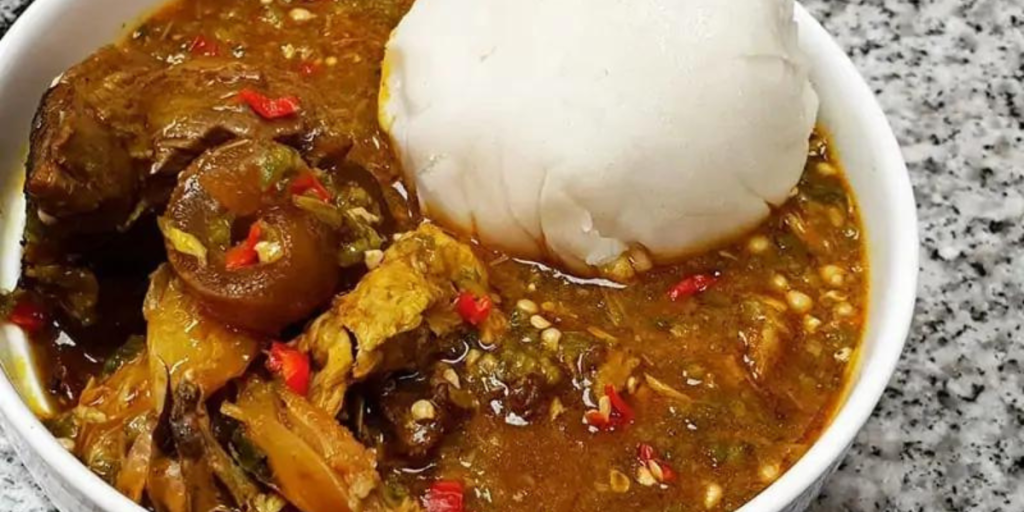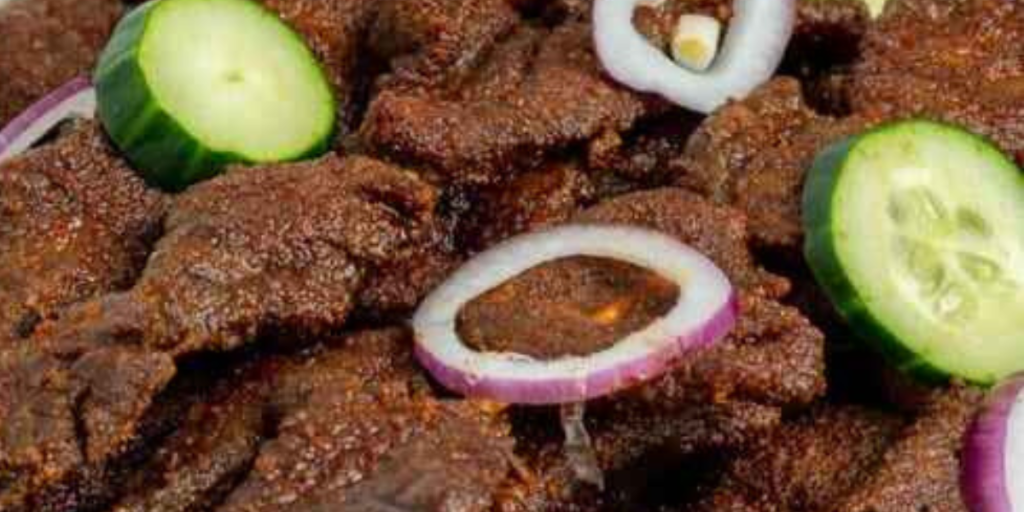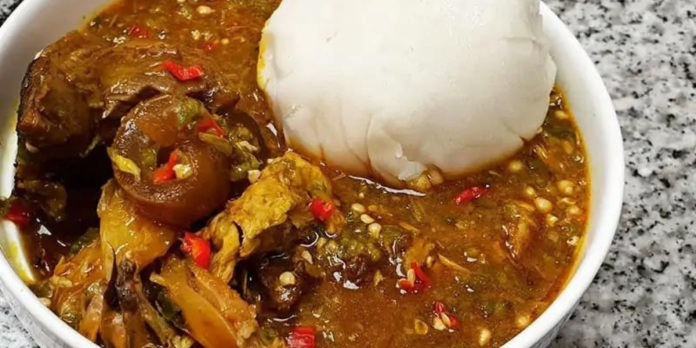Table of Contents
Exploring the Diversity of The Best Dinner in Nigeria
A nation known for its diverse cultural heritage, presents a culinary landscape as diverse and lively as its populace. With an array of tastes and components sourced from different regions, Nigerian cuisine forms an enticing blend of spices, textures, and fragrances that captivate the palate and create a lasting impact.
Unveiling the best dinner adventures in Nigeria involves more than just savoring a meal; it represents an immersive dive into the country’s rich history, culture, and longstanding customs. Come along as we set out on a culinary expedition delving into the essence of Nigeria’s dining scene.
Nigerian dinner traditions reflect the country’s diverse cultural tapestry
Encompassing a fusion of influences from various ethnic groups, including Yoruba, Igbo, Hausa, and Fulani. The typical Nigerian dinner table is adorned with an array of delectable dishes, each bearing the distinct imprint of its region’s culinary identity.
From the aromatic soups of the south to the hearty stews of the north, Nigerian dinners symbolize unity and harmony, bridging the gaps between communities and celebrating the country’s shared heritage.
Top 3 Best Dinner Meal in Nigeria 2023
Pounded Yam

Pounded yam is a popular Nigerian dish which Ranks amongst one of the best dinner , it is made by boiling yams and then pounding them into a smooth, stretchy, and dough-like consistency. It is often served with various types of soups or stews, such as egusi soup, vegetable soup, or ogbono soup. Pounded yam is a staple in many Nigerian households and is enjoyed as a satisfying and filling meal.
How To Prepare
Equipment Needed
Before you begin preparing pounded yam, it’s essential to gather the necessary equipment to ensure a smooth cooking process. Here are the items you’ll need:
- Mortar and pestle or yam pounder
- Pot for boiling the yam
- Knife for peeling and cutting the yam
- Cooking spoon
Ingredients for Pounded Yam
To make pounded yam, you’ll require the following ingredients:
Fresh yam tubers
Water
Step-by-Step Guide to Making Pounded Yam
Follow these simple steps to prepare delicious pounded yam at home:
Step 1: Peel and Cut Yam
Start by peeling the yam and cutting it into smaller chunks. This will make the yam easier to boil and pound.
Step 2: Boil the Yam
Place the yam chunks in a pot of water and boil them until they become soft and tender. This usually takes around 15-20 minutes, depending on the size of the yam chunks.
Step 3: Pound the Yam
Using a mortar and pestle or a yam pounder, pound the boiled yam until it achieves a smooth and stretchy consistency. You may need to add small amounts of water gradually to soften the yam and make the pounding process easier.
Suya Another one of the Best Dinner of 2024

Nigerian Suya is a renowned West African delicacy that tantalizes the taste buds with its rich and spicy flavors. This mouthwatering street food is deeply ingrained in Nigerian culinary heritage and has garnered international acclaim for its unique taste and aroma little wonder it made it into the rank of the top 3 best dinner. In this article, we explore the history, ingredients, preparation methods, variations, and serving suggestions of this beloved Nigerian street food.
Ingredients for Suya
The key to creating authentic Nigerian Suya lies in the meticulous selection and combination of high-quality ingredients. The primary components include:
- Meat: Typically, Suya is made with thinly sliced beef, although other variations might incorporate chicken, liver, or kidney.
- Suya Spice Mix: This blend usually consists of ground peanuts, ginger, garlic, paprika, cayenne pepper, and other traditional spices, imparting the distinctive flavor that defines Suya.
- Vegetable Oil: Used for marinating the meat and ensuring the spices adhere to the surface.
- Onions and Peppers: These are often used as accompaniments to enhance the overall taste and presentation.
Suya Preparation:
Cut the beef into thin slices to ensure even cooking.
Place the meat in a large bowl for marination.
Marinating Process:
Mix the Suya spice blend with vegetable oil to form a paste.
Rub the spice mixture thoroughly onto the meat, ensuring an even coating.
Let the meat marinate for at least one hour to allow the flavors to meld.
Grilling the Suya:
Thread the marinated meat onto wooden or metal skewers, leaving some space between each piece.
Grill the skewered meat over medium heat, turning regularly and basting with the remaining marinade for extra flavor.
Ensure the meat is cooked to your desired level of doneness, achieving a balance between tenderness and a charred exterior.
Jollof Rice: Another One of The Best Dinner

Jollof rice, a beloved West African delicacy, is renowned for its vivid flavors and eye-catching presentation. Typically crafted using long-grain rice, tomatoes, onions, and an array of spices, it boasts a rich and fragrant profile. Commonly featuring bell peppers, chili peppers, and various meats or vegetables, its composition may vary based on individual tastes. A frequent feature at festivities and social gatherings, this dish has secured a place as a culinary cornerstone in numerous West African nations, each adding its own distinctive flair to the traditional recipe.
Ingredients:
- 2 cups of long-grain rice
- 1 can of tomato paste
- 1 large onion, finely diced
- 2-3 fresh tomatoes, either pureed or chopped
- 1 diced red bell pepper
- 1 diced green bell pepper
- 3 cloves of minced garlic
- 1 teaspoon of thyme
- 1 teaspoon of curry powder
- 1 teaspoon of paprika
- 1 teaspoon of cayenne pepper (adjust according to taste)
- 2 cups of chicken or vegetable broth
- Salt and pepper to taste
- Cooking oil
Instructions:
Heat a few tablespoons of cooking oil in a large pot or skillet over medium heat.
Sauté the diced onions and minced garlic until they become golden brown and fragrant.
Add the pureed or chopped tomatoes, red and green bell peppers, and tomato paste. Stir and cook for approximately 5-7 minutes until the mixture thickens and the oil rises to the surface.
Incorporate the thyme, curry powder, paprika, cayenne pepper, salt, and pepper, allowing the spices to infuse the sauce for a few minutes.
Pour in the chicken or vegetable broth and bring the mixture to a gentle boil.
Add the washed rice, ensuring it is thoroughly coated with the flavorsome sauce.
Reduce the heat to low, cover the pot, and allow the rice to simmer for around 20-25 minutes or until it is fully cooked and has absorbed the savory sauce.
Once the rice is tender and cooked to perfection, fluff it with a fork and serve hot.
Immerse yourself in the world of Jollof rice preparation, allowing the fragrant aromas to whisk you away to the heart of West Africa, as you craft a culinary masterpiece that will undoubtedly satisfy your palate.
Conclusion
The top three dinners in Nigeria during 2023 set a new standard for culinary excellence, epitomizing the country’s rich gastronomic heritage. These events highlighted the mastery of local flavors and global influences, demonstrating the ingenuity and creativity of Nigerian chefs. With each dish reflecting a unique blend of tradition and innovation, these dinners left an unforgettable imprint on the Nigerian culinary landscape, solidifying its reputation as a hub for exceptional dining experiences.
In the first of these dinners, held in the bustling city of Lagos, the event showcased a remarkable fusion of traditional Nigerian ingredients with modern culinary techniques. Renowned chefs from across the country gathered to present a menu that paid homage to Nigeria’s diverse cultural history while embracing contemporary cooking styles. One of the standout dishes was a deconstructed jollof rice, a beloved staple in Nigerian cuisine, presented with a modern twist. The rice was cooked to perfection, infused with a rich tomato sauce and paired with delicately spiced grilled chicken. The presentation was a visual feast, with vibrant colors and artistic plating that elevated the dining experience to a new level.
Another highlight of this dinner was the innovative use of locally sourced ingredients. Nigerian chefs have always taken pride in using fresh, local produce, and this event was no exception. From the smoky flavors of suya-spiced beef to the creamy richness of egusi soup, each dish celebrated the bounty of Nigeria’s agricultural heritage. The chefs demonstrated a deep understanding of the ingredients, skillfully balancing flavors and textures to create dishes that were both familiar and surprising. The use of traditional spices and herbs, combined with modern cooking techniques, resulted in a menu that was both nostalgic and forward-thinking.
The second dinner, held in Abuja, the capital city of Nigeria, continued the theme of culinary excellence with a focus on the country’s regional diversity. Nigeria is home to over 250 ethnic groups, each with its own unique culinary traditions. This dinner was a celebration of this diversity, with dishes representing the culinary heritage of different regions. From the spicy, peppery flavors of the South-South to the rich, hearty stews of the North, the menu was a gastronomic journey through Nigeria. One of the most memorable dishes was a seafood okra soup, a traditional dish from the coastal regions, prepared with fresh, succulent seafood and a flavorful, thickened okra base. The chefs paid meticulous attention to detail, ensuring that each dish was authentic yet innovative, reflecting the rich tapestry of Nigerian cuisine.
The third dinner, held in the cultural heartland of Ibadan, was a grand finale that brought together the best of Nigeria’s culinary talents. This event was a true celebration of Nigerian food, with a focus on the interplay between tradition and modernity. The menu featured classic dishes reimagined with contemporary flair, showcasing the versatility and creativity of Nigerian chefs. One of the standout dishes was a modern take on pounded yam and egusi soup. Traditionally, pounded yam is served as a starchy accompaniment to soups, but in this dish, it was transformed into a light, airy mousse, paired with a richly flavored egusi soup reduction. The result was a dish that was both comforting and sophisticated, a perfect example of how traditional Nigerian cuisine can be adapted to suit modern tastes.
In addition to the food, the ambiance and presentation of these dinners were equally impressive. Each event was carefully curated to provide an immersive dining experience, with attention to detail evident in every aspect of the evening. From the elegant table settings to the carefully selected music, every element was designed to enhance the dining experience. The chefs themselves played an integral role, engaging with guests and sharing the stories behind each dish. This personal touch added a layer of intimacy and connection, making each dinner not just a meal, but a celebration of Nigerian culture and hospitality.
How to Make Nigerian Yamarita: Nigerian Best 2024
These dinners also highlighted the growing recognition of Nigerian cuisine on the global stage. In recent years, there has been a surge of interest in African cuisine, with Nigerian food leading the way. The country’s rich culinary heritage, characterized by bold flavors and diverse influences, has captured the attention of food enthusiasts around the world. The success of these dinners is a testament to the skill and creativity of Nigerian chefs, who are pushing the boundaries of traditional cuisine and creating dishes that are both innovative and deeply rooted in their cultural heritage.
Moreover, these events underscored the importance of sustainability and local sourcing in Nigerian cuisine. Many of the ingredients used were sourced from local farmers and producers, highlighting the abundance of fresh, high-quality produce available in Nigeria. This focus on sustainability not only supports local communities but also ensures that the dishes are as fresh and flavorful as possible. By prioritizing local ingredients, Nigerian chefs are promoting a more sustainable and ethical approach to cooking, which is increasingly important in today’s culinary landscape.
The impact of these dinners extends beyond the culinary world, as they also play a significant role in promoting Nigerian culture and tourism. Food is an integral part of any culture, and these events provide a platform to showcase the richness and diversity of Nigerian cuisine to a wider audience. By attracting food enthusiasts and tourists from around the world, these dinners contribute to the growing interest in Nigeria as a travel destination. The positive reception of these events helps to dispel stereotypes and misconceptions about Nigeria, highlighting the country’s vibrant culture and hospitality.
In conclusion, the top three best dinners in Nigeria during 2023 were a celebration of culinary excellence, showcasing the rich heritage and innovative spirit of Nigerian cuisine. These events set a new standard for dining experiences in Nigeria, highlighting the skill and creativity of the country’s chefs. With a focus on local ingredients, sustainability, and the interplay between tradition and modernity, these dinners left an indelible mark on the Nigerian culinary landscape. They not only elevated the perception of Nigerian cuisine on the global stage but also promoted the country’s culture and tourism. As Nigeria continues to gain recognition for its culinary talents, these dinners serve as a shining example of what is possible when tradition meets innovation in the kitchen.






















[…] You might want to check out Our Top 3 Best dinner […]